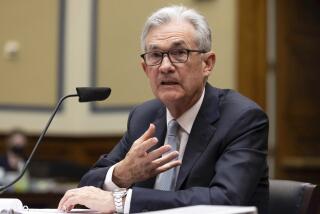Lawrence Klein dies at 93; won Nobel for his econometric models
- Share via
Lawrence Klein, the University of Pennsylvania economist who won the 1980 Nobel Prize for his computer-based models that help governments forecast the future and act accordingly, died Sunday at his home in Gladwyne, Pa. He was 93.
His family announced his death but did not disclose the cause.
The Royal Swedish Academy of Sciences awarded Klein the 1980 Nobel Memorial Prize in Economic Sciences “for the creation of econometric models and the application to the analysis of economic fluctuations and economic policies.” His Wharton Models, named for Penn’s Wharton School, became widely used by nations and regions to predict gross national product, exports, investment and consumption, as well as the potential effect of government policies.
“Thanks to Klein’s contributions,” the Nobel committee said, econometrics — the use of mathematics, statistics and theory to forecast fluctuations in business and the economy — “is now to be found all through the world, not only at scientific institutions but also in public administration, political organizations and large enterprises.”
A former graduate student under Paul Samuelson at MIT, Klein taught at Penn for 33 years. One of his earliest models, in 1946, predicted that the end of World War II wouldn’t send the U.S. economy back into depression, which was a widespread fear, according to a 1980 article in Time magazine. Klein’s correct call helped win respectability for econometric models, Time said.
“I have always believed that people have misjudged the accuracy of economic forecasting,” Klein wrote in an autobiography for the Nobel Foundation. In real-life tests such as the aftermath of wars, shifts in government economic policy and recessions, “econometric models outperformed other approaches,” he said.
Klein was chief economic advisor to Jimmy Carter during his successful 1976 presidential campaign, then returned to academia rather than take a position in the new administration. In declining an appointment, he avoided controversy over his brief membership, in the 1940s, in the Communist Party.
Lawrence Robert Klein was born Sept. 14, 1920, in Omaha. Growing up during the Great Depression “was to have a profound impact on my intellectual and professional career,” he wrote.
He earned his undergraduate degree from UC Berkeley in 1942 and his doctorate from MIT in 1944.
He joined the econometrics team at the Cowles Commission of the University of Chicago, worked on modeling in Canada, visited economists in Europe and then returned to the U.S. to work at the National Bureau of Economic Research.
In the 1950s he held teaching and research posts at the University of Michigan and Oxford University before joining the faculty at Penn in 1958.
Klein, who retired in 1991, is survived by his wife of 65 years, Sonia; three daughters; a son; seven grandchildren; and four great-grandchildren.
More to Read
Start your day right
Sign up for Essential California for the L.A. Times biggest news, features and recommendations in your inbox six days a week.
You may occasionally receive promotional content from the Los Angeles Times.







